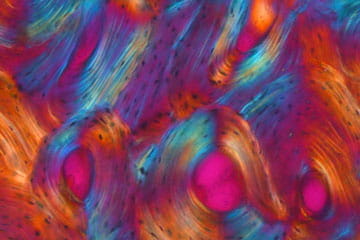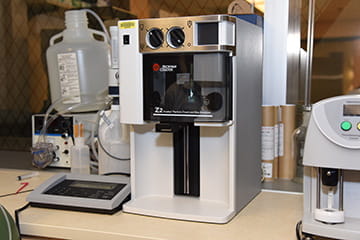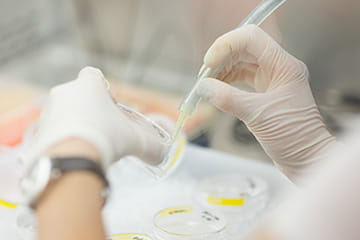The Histology Core is a core facility of the Indiana Center for Musculoskeletal Health and part of the Bone and Body Composition Core of the Indiana Clinical Translational Sciences Institute (CTSI). The Histology Core provides histological services for basic science (non-clinical) research. Both mineralized (plastic embedded) and soft tissue (paraffin embedded) specimens can be prepared by the facility.
Services
Plastic (methyl methacrylate) Embedding and Sectioning Service
This research facility offers processing of specimens through plastic (methyl methacrylate; MMA) embedding as well as thick sectioning of cortical bone, thin sectioning of trabecular (cancellous) bone, and staining of plastic sections.
The facility provides cover-slipped unstained sections for analysis of fluorochromes (dynamic histomorphometry) at no charge. Specialized stains (for static histomorphometry) are available. Goldner’s Trichrome (GT; osteoid, osteoblasts and osteoclasts), Hematoxylin and eosin (HE; routine assessment) and Toluidine Blue (TB; cement lines and cartilage) are available for both thick and thin sections. Tartrate-Resistant Acid Phosphatase (TRAP; osteoclasts) and Von Kossa / MacNeal (VKM; osteoid, osteoblasts and osteoclasts) are available for thin sections only.
Paraffin Embedding and Sectioning Service
The Histology Core offers de-mineralization of mineralized tissue (if necessary), processing of specimens through paraffin embedding, thin sectioning of paraffin-embedded tissue, and staining of paraffin sections.
For routine assessment, slides are stained with hematoxylin and eosin (HE; Harris hematoxylin, regressive method). Specialized stains are available, including Acidified Toluidine Blue (AcTB; for mast cells); Fast Green – Safranin O (FG/SO; for cartilage); Gomori’s Aldehyde Fuchsin, Wenk Modification (GAF; for pancreatic β cells, elastin, mast cells); Jones’ Periodic Acid-Silver Methenamine, AFIP Modification (JPA-ArM; for kidney glomerular capillary basement membrane); Masson’s Trichrome (MT; for collagen); Oil Red O (ORO; for lipids); Periodic Acid Schiff Procedure (PAS; for carbohydrates); Perls Iron Stain (PI); Tartrate-Resistant Acid Phosphatase (TRAP; for osteoclasts); Verhoeff-Van Giesen (VVG; for elastin); and Von Kossa Method for Mineral (VK).
Cryosectioning Service
The Histology Service Core offers frozen tissue sections. Slides can be stained for standard and specialized stains, or for immunohistochemistry. Samples for cryosections should be frozen by the investigator and submitted for sectioning by the core. Please contact Drew Brown to schedule the delivery of the tissues.
Visium Spatial Transcriptomics
If you are interested in next-generation molecular profiling, the Histology Core offers RNA-free sectioning for FFPE blocks in collaboration with the Center for Medical Genomics (CMG). We can section for any type of Visium slide, as well as produce "RNA scrolls" for you to test the RNA quality prior to the analysis. Please reach out to the CMG core first to schedule a time for the spatial transcriptomics analysis, and then we will make sure to complete the sectioning just prior to that date.


